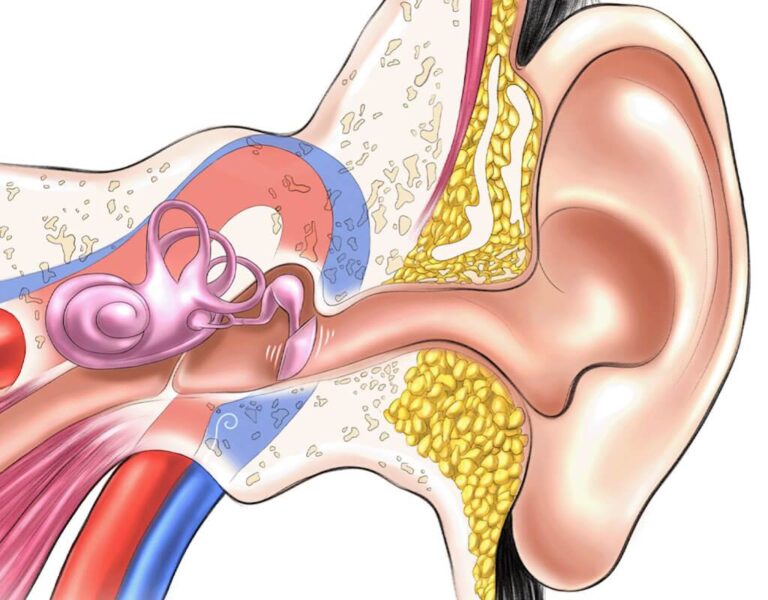As I mentioned earlier, our company, it’s an association of not very young people. And, of course, a variety of age-related problems arise.
Somehow, someone once remarked that the only way to live long is to grow old. And most people believed it! But our commonwealth has just come together to oppose this lousy slogan. Aging, is nothing more than a form of adaptation of matter.
But the problems are gradually growing, and one of them is tinnitus.
I have been asked to do a brief review of this phenomenon to try to remove another brick of ignorance in our company.
So, what did I dig up in our global virtual environment? Some of the search results surprised me!
What is tinnitus and what are its causes?
It turns out that tinnitus is our perception of sound in the absence of an external source of sound itself. It is most often described as ringing in the ears. Some define it as a buzzing, whistling, hissing, and possible combinations thereof. Tinnitus can occur in one or both ears.
The main thing to understand is that tinnitus is not a disease.
But it can be a symptom of some problems in a person. Therefore, understanding the causes of tinnitus can help in effectively treating this condition.

The number of factors that can provoke tinnitus are many.
A fairly common cause is damage to a person’s auditory system. And most often this happens with prolonged exposure to loud sounds. This happens in occupations such as construction or the music industry. As a result of attending loud concerts or using musical devices at high volumes.
A sudden very loud one-time sound can also be a possible cause.
Age-related hearing impairment is a predictable cause that generates tinnitus.
The mechanism is due to gradual damage or destruction of the delicate hair cells of the inner ear. This age-related damage can lead to tinnitus.
Certain medical conditions can also contribute to the development of tinnitus.
Ear diseases, ear infections, otosclerosis, and several others, can lead to tinnitus symptoms.
Often, high blood pressure, temporomandibular joint disease, and tumors in the auditory system can also cause or exacerbate tinnitus.

Occasionally, individual intolerance to certain medications can cause tinnitus as a side effect.
If you suspect that any medication may be causing or exacerbating tinnitus, it is important to consult with your physician to find an alternative or adjustment.
In many cases, the exact cause of tinnitus cannot be determined, resulting in what is called subjective tinnitus. However, by understanding the various factors that may contribute to this condition, people can take steps to mitigate its effects and seek appropriate treatment.
What can be done to relieve tinnitus?
To diagnose tinnitus, the healthcare provider usually begins by gathering a detailed medical history. Then a physical examination is performed, paying particular attention to the ears and associated structures.
A hearing test is mandatory to assess the degree of hearing impairment and to determine if any specific frequencies are affected.
If there remains uncertainty in the diagnosis, additional tests may be ordered to determine the possible causes of the hearing impairment.

To date, no cure for tinnitus is known!
But there are several options for dealing with tinnitus that can help manage it and reduce its impact on daily life.
The choice of method depends on the severity of the symptoms, underlying causes, and individual preference.
One common approach to tinnitus relief is sound therapy. This involves using external sounds to distract attention from the tinnitus and obtain relief. This can be background music or specialized hearing aids that make soothing sounds.
There is something called cognitive behavioral therapy. It can help people cope with the emotional and psychological effects of tinnitus. Tools for relaxation, stress reduction, and improved sleep are used to enhance the positive effects.
In difficult cases, medications may be used. But there are no specific medications to treat tinnitus. Remedies are used to reduce the severity or reduce the emotional impact of tinnitus. These can be both medications and natural remedy kits to reduce anxiety and distress.
If tinnitus is caused by some sort of medical condition, treating it can eliminate or greatly alleviate the problem. For example, if the tinnitus is the result of a middle ear infection, treating the infection may eliminate the tinnitus.
Are there alternatives?
In addition to the methods listed above, several alternative approaches and self-help strategies are used to get rid of tinnitus. These approaches may not work for everyone, but some people find them helpful for alleviating symptoms and improving quality of life.
One popular alternative method of dealing with tinnitus is acupuncture.
There is limited scientific evidence that acupuncture is effective in reducing tinnitus. But some people report relief and a decrease in tinnitus intensity after acupuncture sessions.

Relaxation techniques such as yoga, meditation, and deep breathing exercises can help people cope with tinnitus. These practices promote relaxation and stress relief and can alleviate the stress associated with tinnitus.
Herbal supplements and vitamins are often advertised as potential methods of reducing tinnitus. Some people claim that such supplements have helped them reduce the symptoms associated with tinnitus. But scientific studies, unfortunately, have not shown significant positive results.
You should consult your doctor before starting any supplements, as they may interact with other medications or have side effects.
Social platforms with support groups and counseling help people with tinnitus reduce feelings of isolation and provide emotional support.
It is important to note that alternative methods should be approached with caution and in consultation with medical professionals.
What works for one person may not work for another. Some alternative methods may have limited scientific evidence or even be dangerous.
By exploring both traditional and alternative methods, people with tinnitus can find a personalized approach to effectively relieve their symptoms.
So what do we end up with in the fight against tinnitus?
This is the kind of varied information I got from the net.
Some knowledge surprised me and some upset me. The sad thing is that there seems to be nothing to treat. Exactly the treatment!
And in our company, several people feel tinnitus. People of different ages, different occupations, and social statuses. Of course, each of them does something to alleviate their unenviable condition.
And in our company, several people feel tinnitus. People of different ages, different occupations, and social statuses. Of course, each of them does something to alleviate their unenviable condition.
Sometimes they tell us about their successes and failures in the struggle with this ailment. In our company, from time to time, we have such meetings, where anyone can share any of their problems.
It happens that the “collective experience” helps in this or that situation. Psychologically it is also important so that the person is not alone with his difficulties in life.

At a recent meeting, two people from our company shared their positive experiences with tinnitus.
They were a lovely middle-aged woman and a man in his 50s.
According to them, it took more than one month, and only their persistence made it possible to achieve some success.
It turned out that the woman, it was her second attempt. She had already tried to get rid of tinnitus a couple of years earlier, but after a short time the problem returned.
And what is interesting is that they used different remedy.
As I understand it, they were not medications. But some kinds of natural remedy kits, which according to the classification fall under the section of nutritional supplements.
But both emphasized that they purchased and began using these remedies only after consulting with their physician.
You can learn more about their successes against tinnitus in this post:
How I Stopped Ringing in Ears
As you know, “miracles” happen too, if you prepare for them carefully!

